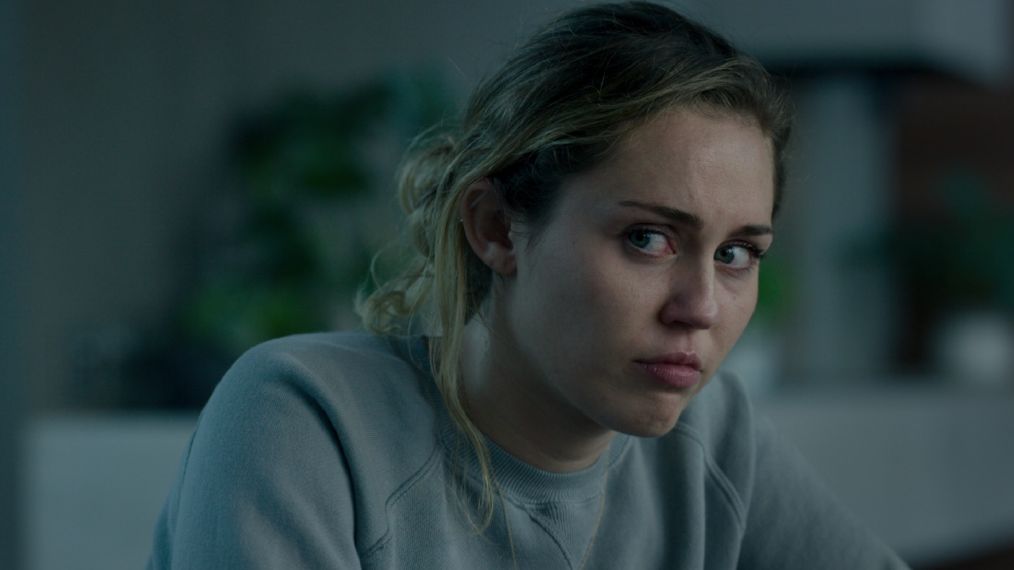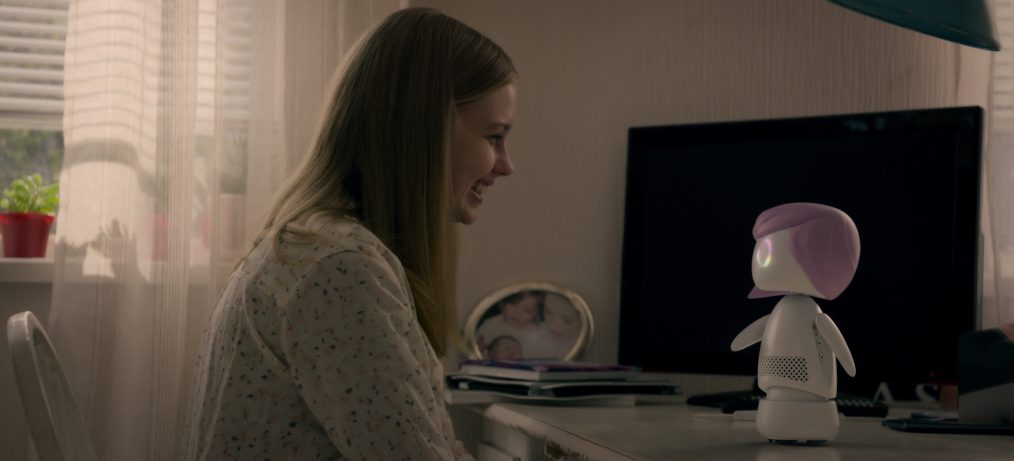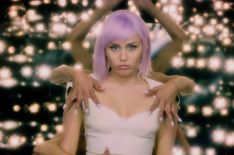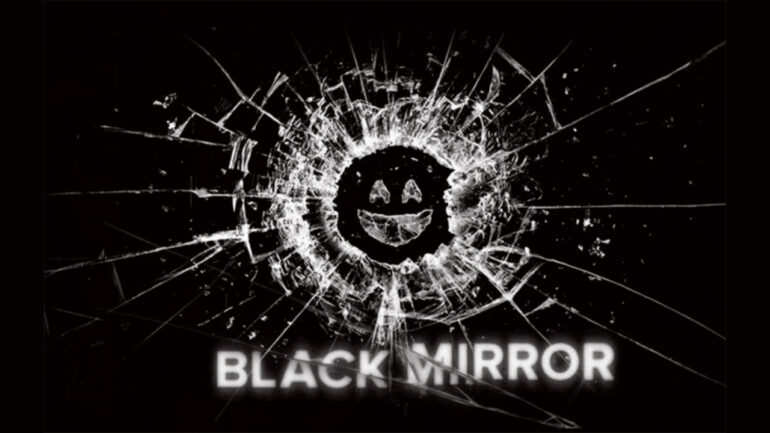‘Black Mirror’ and Miley Cyrus Satirize the Music Industry in ‘Rachel, Jack and Ashley Too’ (RECAP)

Spoiler Alert
[Warning: The below contains MAJOR spoilers for the Black Mirror Season 5 episode “Rachel, Jack and Ashley Too.”]
For my money, “Rachel, Jack and Ashley Too” (a random nod to late 80s British comedy-drama Rita, Sue and Bob Too) is the standout amongst the three new episodes. While it never quite reaches the heights of Black Mirror‘s greatest hits, it comes pretty damn close, and that’s mostly due to its timely satirical attack on the music industry. The subject matter here is bleak, and depressingly accurate at times, and yet it still maintains a sense of fun or humor throughout.
The casting of Miley Cyrus as the eponymous pop sensation Ashley O is a masterstroke that lends the story instant credibility. What better way to dramatize the career of an international pop star than with a real-life international pop star? As a former Disney idol who has experienced industry exploitation first-hand, as well as battled with her own image issues as she transformed from the childhood innocence of Hannah Montana to foam-finger frolicking rebel, Cyrus brings genuine anger and pathos to the role while also getting to have some foul-mouthed fun in the process.
Ashley O is a sickly-sweet tween-icon with her purple hair and pearly-white smile attracting a legion of devoted young fans. She sings inspirational poptastic music and spouts empty platitudes in public interviews. But Ashley is more than just a famous musician – she is a brand controlled by her overbearing aunt/manager Catherine (Susan Pourfar) and a cold-blooded PR team. The management’s latest marketing stunt is the “Ashley Too” robot, a sort of Alexa-style virtual assistant that replicates the singer’s voice and overly positive personality.
The Ashley Too may be a cynical cash-grab, but it comes at precisely the right time for Ashley O superfan Rachel (Angourie Rice), a shy 15-year-old girl who recently lost her mother and is struggling to make friends at her new school. Her dad pays more attention to his rodent traps than he does his kids, and her gloomy, rock-band-loving older sister Jack (Madison Davenport) has become increasingly aloof since their mom died. So while Ashley Too might just be a “stupid doll” in Jack’s eyes, to Rachel, the robot is a friend who listens and makes her feel confident.

Netflix
However, the doll is not a true reflection of Ashley’s personality, nor the smiley-happy persona she presents on TV. In the real world, Ashley is in a state of depression, trapped and suffocated in a life that isn’t her own. The thoughtful, introspective music she wants to make is ignored, and her creativity is stifled. In many ways, she’s just as lonely as Rachel, despite having money and success and an army of followers. Ashley is essentially a performing puppet, exploited by her aunt for clicks and ticket sales and dosed up on meds so that she remains susceptible to manipulation.
It’s this vicious attack on music industry exploitation which gives the episode its strength. Ashley is put into a chemically-induced coma, restrained to a hospital bed where her creative juices are literally sucked dry. While fans weep for their comatose pop hero, Catherine sets to work on her grand plan, first extracting her niece’s brainwaves and turning them into pop hits, and then unveiling the Ashley Eternal, a fully-controllable and scalable holographic performer based on Ashley O. It seems ridiculous, and it is (especially the pitch-shifting dream songs), but it’s also not a million miles away from where the music industry is at currently.
Holographic performances are becoming an increasingly common trend. In recent years, the likes of Elvis, Maria Callas, Frank Zappa and Roy Orbison have been reanimated for digital tours, and just last month, the VFX company Base Hologram announced that Whitney Houston would be returning to the stage in 3D holographic form. Interestingly, that same company had to postpone a planned Amy Winehouse tour after facing “unique challenges and sensitivities” when trying to replicate the late singer in “the most celebratory and respectful way possible.”
There is a certain nostalgic novelty value to these hologram tours, but beyond that, it’s an incredibly ghoulish endeavor. Whether an artist’s family or estate signs off on it or not, it’s hard not to view the entire thing as a desperate attempt to milk every last penny out of a musician’s legacy. It’s one thing to sample a dead singer’s voice in a song, reissue a greatest hits compilation or release unheard archival tracks; it’s an entirely different thing to mimic the dead on stage. It’s exploitation from beyond the grave.
“Rachel, Jack and Ashley Too” takes the recent trend to its extreme; Catherine is literally willing to kill Ashley because she knows she can make more money out of her if she’s dead. She doesn’t need the real thing anymore. She has Ashley’s likeness, her image, her mannerisms, her vocal timbre, and with all of that she can continue to pump out new music and embark on global tours without having to deal with the human behind the performer. After all, a hologram doesn’t complain or suffer from stress and fatigue, and most importantly, it doesn’t need to be paid.
That’s the other scary thing about the hologram tour boom; it takes away power from the artist. Right now, the industry is primarily focused on raising the dead, but how long before living artists start sending out digital copies in their stead? I mean, it’s already slowly starting to happen. In 2011, Mariah Carey had her hologram perform simultaneously in five European cities, and just last year, rapper Chief Keef, who can’t enter the UK himself due to legal restrictions, sent his hologram to London in his place. And once the software exists to generate a performer’s voice, as we see in Black Mirror, then it could be game over for the artist.
Fortunately, the real world isn’t quite there yet, and even in this episode, the evil management company doesn’t get its way. Rachel and Jack, with the help of Ashley Too, end up saving the day. The girls remove a filter from the doll, which gives it sentience – it turns out Ashley’s brain matter was basically copied and transplanted into the robots. Unfiltered and full of vengeance, Ashley Too lets loose, allowing Cyrus to curse up a storm. “Get this cable out of my a**! Holy s**t!” the robot yells. It’s a fun final sequence, and together, the trio frees the real Ashley from her hospital bed and gatecrashes Catherine’s elaborate media event, exposing her evil deeds.
The ending itself feels a little slapdash, which has been the case in all three of these season five episodes. Ashley gets her happy ending, shedding her pop image and gaining creative freedom; she forms a rock band with Jack (I’ve had Nine Inch Nails “Head Like A Hole” stuck in my head since seeing the episode). But poor Rachel feels like an afterthought. Yes, she got to meet her idol and have her fangirl moment, but now her favorite singer is in a band with her sister performing a completely different genre of music to the kind she loves. It’s a sort of sad ending for Rachel when you think about it.
That said, it’s hard to fault this episode too much because it did absolutely nail its subject matter, no doubt helped by Cyrus and the personal touch she brought to the story, on top of a terrific performance which showed off her serious acting chops (honestly, Miley Cyrus needs to act more!). In fact, the performances across the board were excellent. Rice brilliantly portrayed the unease and awkwardness of an introverted young girl trying to figure herself out, and while Davenport had less to do as the cynical older sister, she shined in the comedy bits, particularly when posing as an exterminator when invading Ashley’s Malibu mansion (“Is this breadbox certified?”).
“Rachel, Jack and Ashley Too” is one of those Black Mirror episodes, like “The Waldo Moment” or “Nosedive,” that is only going to get better with time as its material becomes even more worryingly prescient. Now, please excuse me, I have a Buddy Holly tour to get to.
Black Mirror, Season 5, Streaming Now, Netflix












